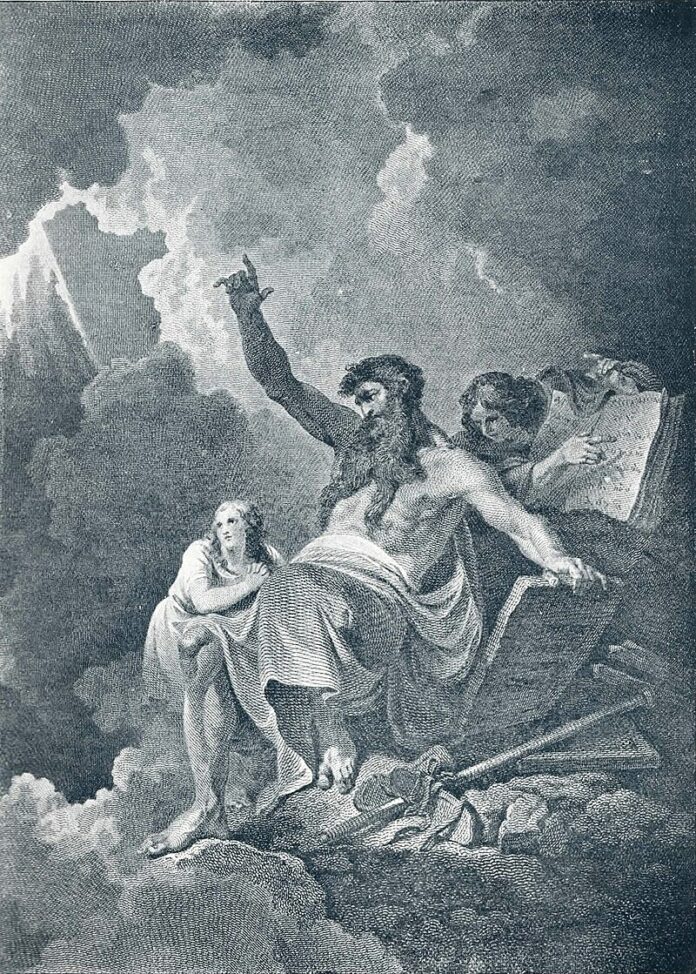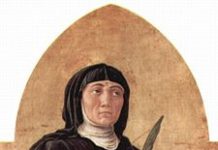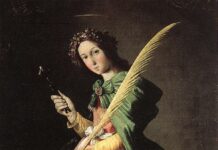
Ever since the New Atheism crowd emerged several decades ago, there has been an ongoing campaign to nullify the great historical importance of Christianity throughout Western Civilization. Indeed, efforts continue to be made to prove that Jesus never existed (see my previous article at Catholic Insight, “How Do We Know Christ Really Lived?”).
Brooke Allen in her article “Our Godless Constitution” (The Nation, February 3, 2005) and in her book Moral Majority: Our Skeptical Founding Fathers (2007), alleged the Founders were anything but Christian. The perennial controversy that will not go away turns on the question of whether American culture was founded upon ultimately religious, or quasi-religious, or strictly secular principles. Any calm and rational approach to the subject will lead inescapably to the conclusion that the Founders had many dogs in the fight. But that has never stopped today’s secular zealots from arguing a number of false assumptions about the dominance of their own champions among the Founders. For example, in many atheist publications Thomas Jefferson and Thomas Paine are trotted out as if they were fellow travelers in the atheist camp.
Thomas Jefferson
But this is what Jefferson said about atheism in his April 11, 1823 letter to John Adams.
The argument which they [atheists] rest on as triumphant and unanswerable is that, in every hypothesis of cosmogony, you must admit an eternal pre-existence of something; and according to the rule of sound philosophy, you are never to employ two principles to solve a difficulty when one will suffice. They say, then, that it is more simple to believe at once in the eternal pre-existence of the world, as it is now going on, and may forever go on by the principle of reproduction…. On the contrary, I hold (without appeal to revelation) that when we take a view of the Universe in its parts general or particular, it is impossible for the human mind not to perceive and feel a conviction of design, consummate skill, and infinite power in every atom of its composition….
Jefferson clearly was no atheist. Was he a deist or a theist? He rejected orthodox religion (this did not inhibit him from lodging his daughter at a Catholic convent when he was Ambassador to France). Jefferson, steeped in rationalism, could not abide the notion of miracles. For this reason, as a personal challenge to himself, he undertook to edit the Gospels, removing all the passages that documented the miracles of Jesus. Yet Jefferson had an abiding admiration for the character of Jesus:
To the corruption of Christianity I am indeed opposed; but not to the genuine precepts of Jesus himself; I am a Christian in the only sense he wished anyone to be; sincerely attached to his doctrines in preference to all others.
Jefferson believed in the immortality of the soul. Approaching death, he penned these hopeful lines to his friend John Cartwright:
Your age of eighty-four and mine of eighty-one years insure us a speedy meeting. We may then commune at leisure, and more fully, on the good and evil which, in the course of our long lives, we have both witnessed.
In many of his letters Jefferson proclaimed a sentiment of prayerful dependence on God. Several weeks prior to his death he composed for his daughter a thoughtful poem about his hope that he would soon meet loved ones who had gone before him. Surveying the full scope of his writings, one cannot imagine him falling into that category of deists who are supposed to have conceded that if God did create the world, He must have turned away from his creation and wanted little more to do with it.
Thomas Paine
Was Thomas Paine religious? Paine, who coined the phrase “the United States of America,” and who provided more than any other writer and thinker the philosophical rationale for the Revolution, was a chronic rebel against all established authority but one … the authority of Reason. He certainly was a deist, rather than an atheist, though the passion of his attacks on Catholic, Protestant and Jewish faiths cannot be denied and may mislead uninformed readers to suppose that he was, as Theodore Roosevelt wrongly called him, “that dirty little atheist.” But from Paine’s own pen flowed the following:
Religion has two principal enemies, fanaticism and infidelity, or that which is called atheism. The first requires to be combated by reason and morality, the other by natural philosophy.”
Modern atheists who claim Paine as one of their champions must struggle to explain away this passage from a letter to Samuel Adams:
The people of France were running headlong into Atheism, and I had the work [Age of Reason] translated into their own language, to stop them in that career, and fix them in the first article of every man’s creed, who has any creed at all — I believe in God.
Madison and Jefferson were deeply indebted to Paine as the forerunner of those who would fight for a strict separation of Church and State. But Paine never advocated enmity between Church and State: As to religion, I hold it to be the indispensable duty of all government to protect all conscientious professors thereof, and I know of no other business which government hath to do therewith. Like Jefferson, Paine turned out to be a champion of the rights of religion, even the denominations he despised.
George Washington
Was George Washington religious? Speaking for himself:
Religion is as necessary to reason, as reason is to religion. The one cannot exist without the other. A reasoning being would lose his reason, in attempting to account for the great phenomena of nature, had he not a Supreme Being to refer to; and well it has been said, that if there had been no God, mankind would have been obliged to imagine one.”
And again in his Farewell Address:
Of all the dispositions and habits, which lead to political prosperity, Religion and Morality are indispensable supports. In vain would that man claim the tribute of Patriotism, who should labor to subvert these great pillars of human happiness, these firmest props of the duties of Men and Citizens…. And let us with caution indulge the supposition, that morality can be maintained without religion.
John Adams
Was John Adams religious? I have examined all religions, as well as my narrow sphere, my straightened means, and my busy life, would allow; and the result is that the Bible is the best Book in the world. It contains more philosophy than all the libraries I have seen.
And Again to Jefferson: Without Religion this World would be Something not fit to be mentioned in polite Company, I mean Hell.
Adams, to be sure, was no traditional Christian. History calls him a Unitarian, much opposed to the divinity of Christ and the doctrine of the Trinity. Like Jefferson, and consistent with the deist tradition, he was a thorough rationalist and would have nothing to do with miracles and the Catholic Church. Yet, again like Jefferson, he had a deep and abiding fondness for the character of Jesus. The general principles upon which the Fathers achieved independence were the general principles of Christianity…. I will avow that I believed and now believe that those general principles of Christianity are as eternal and immutable as the existence and the attributes of God.
Benjamin Franklin
Was Benjamin Franklin religious? In his Autobiography we find the following remarks: I never doubted, for instance, the existence of the Deity; that he made the world, and governed it by his Providence; that the most acceptable service of God was the doing good to man; that our souls are immortal; and that all crime will be punished, and virtue rewarded, either here or hereafter.
Though nominally a Presbyterian, Franklin rarely attended church. Like many of the deists, he was a rationalist and was counted a great man of science and invention. But if the essence of deism is to regard God as aloof and a distant observer of human affairs, it hardly seems likely that Franklin was a hard-shelled deist based on the following remarks he made to the president of the Constitutional Convention in 1787 as recorded by James Madison:
I have lived, Sir, a long time, and the longer I live, the more convincing proofs I see of this truth — that God governs in the affairs of men. And if a sparrow cannot fall to the ground without his notice, is it probable that an empire can rise without his aid? We have been assured, Sir, in the sacred writings, that except the Lord build the House they labor in vain that build it.’ I firmly believe this; and I also believe that without his concurring aid we shall succeed in this political building no better than the Builders of Babel; We shall be divided by our little partial local interests; our projects will be confounded, and we ourselves shall become a reproach and bye word down to future ages. And what is worse, mankind may hereafter from this unfortunate instance, despair of establishing Government by Human Wisdom and leave it to chance, war, and conquest. I therefore beg leave to move — that henceforth prayers imploring the assistance of Heaven and its blessings on our deliberations, be held in this Assembly every morning before we proceed to business, and that one or more of the Clergy of this City be requested to officiate in that service.
James Madison
Was James Madison religious? Madison, the Father of the Constitution and the Fourth President, unlike his friend Jefferson, was a very private man about his religious views. While President, Madison attended St. John’s Episcopal Church. But like Jefferson he was in all probability more of the deist persuasion. He considered the many denominations superstitious and troublesome, forever battling for turf and preference. A man of enormous intellect and character, Madison fought vigorously for religious freedoms and for the separation of Church and State. None of the Founding Fathers matches his record of securing state and federal protections against any one faith encroaching upon the freedom of other faiths by establishing itself as the dominant, tax supported church. Madison was for any law that protected religious freedom. There is no evidence in his writings that he was an atheist, as some atheists would have us believe. Moreover, it is Madison’s legacy that has insured against the possibility of wholesale attacks on religious freedoms so frequently observed in other, more atheistic, cultures during the last hundred years.
Patrick Henry
Was Patrick Henry religious? Governor of Virginia and great orator famous for “Give me liberty or give me death!” Henry was a devoted reader of Scriptures. As he lay dying, he said to his physician, Doctor, I wish you to observe how real and beneficial the religion of Christ is to a man about to die….I am, however, much consoled by reflecting that the religion of Christ has, from its first appearance in the world, been attacked in vain by all the wits, philosophers, and wise ones, aided by every power of man, and its triumphs have been complete.
Nathan Hale
Was Nathan Hale religious? Hale, a spy for the colonies during the revolution, was captured and hanged. Famous for his last words, I regret that I have but one life to lose for my country, Hale requested a Bible to read from, which he was denied. Since he was but twenty-one years of age at the time of his execution, he was not able to leave more evidence of his religious leanings.
George Mason
Was George Mason religious? Mason was the creator of the Virginia Declaration of Rights that became the model for the Bill of Rights. Article XVI of the Declaration reads: “That Religion, or the Duty which we owe to our creator, and the Manner of discharging it, can be directed only by Reason and Conviction, not by force or Violence; and therefore, all Men are equally entitled to the free exercise of Religion, according to the Dictates of Conscience; and that it is the mutual Duty of all to practice Christian Forbearance, Love, and Charity, towards each other.”
Mason was an Episcopalian. His Christian credentials were convincingly stated before his death:
I, George Mason … do make and appoint this my last Will and Testament. My soul, I resign into the hands of my Almighty Creator, whose tender mercies are over all His works, who hateth nothing that He hath made and to the Justice and Wisdom of whose dispensation I willingly and cheerfully submit, humbly hoping from His unbounded mercy and benevolence, through the merits of my blessed Savior, a remission of my sins.
Alexander Hamilton
Was Alexander Hamilton religious? Together with John Jay and James Madison, in The Federalist Papers Hamilton hammered out a consensus-oriented rationale for what would become the United States Constitution. Hamilton agreed with his great friend George Washington, that religion was a necessary prop for the republican form of government:
I have carefully examined the evidences of the Christian religion, and if I was sitting as a juror upon its authenticity I would unhesitatingly give my verdict in its favor. I can prove its truth as clearly as any proposition ever submitted to the mind of man.
There is some probability that in his youth, as did some of his contemporaries, Hamilton toyed with a youthful skepticism toward tradition and religious authority, but the death of his son Philip later brought him to his senses. He returned to his Episcopal roots, and by 1802 was ready to propose establishing a political party called the Christian Constitutional Society. On his deathbed, after a duel with Aaron Burr (whose candidacy for the presidency he had sabotaged) Hamilton received Holy Communion from an Episcopal priest.
John Jay
The first Chief Justice of the Supreme Court, John Jay, was one of three Founders who in the Federalists Papers debated and pioneered many of the concepts later adopted in the Constitution. He certainly did not fear Christianity when he said:
Providence has given to our people the choice of their rulers, and it is the duty as well as the privilege and interest of our Christian nation, to select and prefer Christians for their rulers.
John Marshall
John Marshall, appointed the third Chief Justice by Thomas Jefferson, was just as blunt:
No person, I believe, questions the importance of religion to the happiness of man even during his existence in this world. The American population is entirely Christian; and with us Christianity and religion are identical. It would be strange indeed if, with such a people, our institutions did not presuppose Christianity, and did not often refer to it and exhibit relations with it.”
Abraham Lincoln
Was Abraham Lincoln religious? Lincoln, who at the end of the Civil War restored the United States Constitution throughout the land, might be thought of as the last of the Founding Fathers. In his youth he was hardly a traditionalist in religion. Like so many educated types of his day, he celebrated the rule of reason over spirituality. His keen logical mind dedicated itself to the demands of the legal profession and he was rarely seen in church. Yet there is no evidence Lincoln thought or spoke bitterly of orthodox religion as Paine did. On the contrary, he said:
I do not think I could myself be brought to support a man for office whom I knew to be an open enemy of, or scoffer at, religion. Leaving the higher matter between himself and his Maker, I still do not think any man has the right to insult the feelings, and injure the morals, of the community in which he may live.
Like Jefferson, Lincoln counted on the universal sense of mankind as a powerful argument for the existence of God. He further noted:
I can see how it might be possible for a man to look down upon the earth and be an atheist, but I cannot conceive how he could look up into the heavens and say there is no God.
Shortly before he was assassinated Lincoln confided to friends that he hoped one day, upon his retirement from the Presidency, to visit Jerusalem. Perhaps the atrocities of war had turned his thoughts and feelings toward loftier things. Little did he know that his own Calvary was fast approaching.
Conclusion
It appears, then, that in no way did atheism hold sway over the hearts and minds of the Founders. Deism, on the other hand, a liberal offshoot of Protestantism, for some of the Founders did result in a break with traditional religion and a repudiation of the quarrels between religious sects of which the whole world was by then rather weary. But the deists could not have failed to notice that the mass of mankind viewed them with suspicion. The average Christian must have asked himself why a so-called “rational” approach to God requires that one should believe God simply wound up the universe like a clock and had nothing more to do with it.
Moreover, any discussion of the religious persuasion of the Founders cannot overlook that fact that the colonies were filled with religious folk of every ilk uniting together with their leaders to produce a better and more balanced political system than had ever existed. The Founders in a literal sense were all of the first citizens, mostly Christians along with a handful of notable deists. Alexis de Tocqueville, the 19th Century Frenchman who visited the New World and vigorously studied the source of America’s greatness, put it as succinctly as any outsider could in his book Democracy in America.
Christianity is the companion of liberty in all its conflicts, the cradle of its infancy, and the divine source of its claims.
Today, in the classroom, in the media, and in the courts there appears to be little or no attention given to the real reason for the separation of church and state that was advocated by the Founders. The aim was not to diminish the importance of religion. The aim certainly was to remove from every particular religious denomination any opportunity to seize, to control, or to be tax supported by the local, state, or federal governments. But the First Amendment’s call for the protection of religious freedom was a far cry from the interpretation of modern day secularists that the Founders meant to forbid any mention of God or any expression of religious piety in the public square. The Founders did not fear religion in general or Christianity in particular. Indeed, without exception they regarded religion of one kind or another as the indispensable prop for all our freedoms.
It was Thomas Jefferson who cautioned Americans against the day when they might throw away their freedoms. Yes we did produce a near perfect Republic. But will they keep it, or will they, in the enjoyment of plenty, lose the memory of freedom. Material abundance without character is the surest way to destruction.
Jefferson suspected the means by which that corruption would be most effectively achieved: state governments would be swallowed up by the federal government, and the mechanism for this would be the courts.
It is a very dangerous doctrine to consider the judges as the ultimate arbiters of all constitutional questions. It is one which would place us under the despotism of an oligarchy, one similar perhaps in Jefferson’s mind to Plato’s oligarchy of philosopher/kings. On at least one occasion Jefferson referred to the Supreme court as a device for sneaking monarchy into the constitution. On this subject the ultimate cynic, Jefferson concluded that the Courts love the people always, as wolves do the sheep.
Indeed, how could the Founders have imagined that one day in the distant future a bare majority of Supreme Court jurists would have legitimized pornography under the guise of free speech, abortion under the guise of a right to kill one’s unborn child, and same/sex marriage under the guise of a right to license same-sex sodomy.
The evangelist Franklin Graham concurs. Commenting on historic developments in the Supreme Court, developments that the Founders could never have envisioned, Graham said: We have to take this very seriously and realize we’re losing our country, and we’re going to lose our freedoms that we’ve enjoyed as Christians in this country – we’re losing those quickly. Not only are we losing them around the world; we’re losing them in this country.
Many will ask what is to be done. We might collectively do what Lincoln suggested in the darkest days of the Civil War: fall to our knees and pray for God’s justice and mercy. Certainly the Patriotic Rosary is a good place to start. Another remedy is to elect truly Christian leaders from all parts of the country. “Truly” is the operative word. A Supreme Court dominantly composed of self-identified Catholics in recent years licensed same-sex marriage as a Constitutional right. That no excommunications (or at least an ecclesial retort reprimand, Ed.) followed for the Catholic Justices who voted with the majority is a story this writer is too baffled to cover.
Stultus dicit in corde suo non esse Deum. Psalms 14:1











